Stay in the know on all smart updates of your favorite topics.
Introduction meeting GO!-NH Accelerator Sustainable Innovation 2020

Introduction meeting GO!-NH Accelerator Sustainable Innovation 2020
The GO!-NH Accelerator puts SMEs and start-ups on the fast track to development. New ways of thinking, new skills and new partners are a must. In a three-month programme you’ll go from concept to a business offering innovative solutions that’s ready to take the market by storm. Interested?
With the help of these introduction meetings, you will get to experience the program and learn from participating teams about what the previous programs brought them.
February 10th 2020 - IDEA, Alkmaar - 15:30 - 18:00
Apply through Eventbrite: https://gonh2020-10feb.eventbrite.nl
ABOUT GO!-NH
The GO!-NH Accelerator puts SMEs and start-ups on the fast track to development. New ways of thinking, new skills and new partners are a must. This programme is all about circular economy, targeting sta-ups, innovative SMEs, large organisations and institutions. GO!-NH brings together all the relevant parties to activate, connect and develop this sustainable innovation ecosystem.
In a three-month programme you’ll go from concept to a business offering innovative solutions that’s ready to take the market by storm. Training sessions, tools and professional support from expert practitioners will help you in developing your business in a sheltered environment. The progress you make during these few months would normally take a full year. GO!-NH is a joint venture of the province of North Holland and Innomics.
The Accelerator program enables startups, innovative SMEs and innovation teams from large organizations to convert ideas into new business models in a short time and to accelerate customer and product development in order to shorten the time to market. You develop your business with training, tools and professional support from experts.
Permaculture Impact on Schools, Europa School Transformation
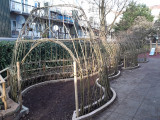
Our children are growing on paved, 2 dimentional and disconnected school environments. We are here to change that. With our passion Permaculture concept, we designed and created a new style of school garden, which doesn't exist in Amsterdam and if we are not wrong in the Netherlands. It was not the first of our school design/implementation. Laterna Magica School in IJburg Amsterdam is also another example.
You can find further info, photos, videos on our website. We need help from all aware people to inform schools about our services that we can have more impact on our environment and children's connection with nature
KASKANTINE 4.0

The Kaskantine will implement together with the neighboorhood its design for closing local resource loops: a kitchen with closed water cycle, preventing local food waste, introduce neighbourhood composting, and organise repair cafe's, sport and musique workshops, etc. Data will be gathered to monitor the resource cycling and methods will be tested to make it more socially and culturally inclusive.
User-created nature-based solutions in an urban environment;
The case of the KasKantine (Greenhouse Cantina), Amsterdam
Historically landscape architecture and infrastructural planning have assigned physical separated functions to landscape in order to upscale and manage resource flows cost efficiently. Rather than monosectoral and large scale linear production systems we can now see a shift to decentralized and locally integrated solutions to close resource loops. In these solutions also citizens can play a more (pro)active role. After being more prominent in rural areas, landscape architecture is now also more active as a lead design principle in urban neighbourhoods. Local integrated solutions for resource cycling efficiency give rise to multiple value production rather than to an increase of local financial income. Either way it increases citizen driven (semi)professional activities in resource management in urban neighbourhoods, as well in its creation and in management.
We see enormous potential in this approach: it can reconnect citizens to nature, it can facilitate in changing lifestyles AND produce the right technology to face our climate and resource crisis. But before it can become mainstream, we see the following challenges and questions, mainly to do with creating sufficient local political support and accessibility to these technological and economic opportunities.
- How can actors on local level on one side and central sectoral level at the other side co-create and redesign effectively the landscape, necessary to close resource loops locally with sufficient democratic legitimacy?
- How could citizen-driven services in resource management be held accountable to a broader public and the public sector?
- How can these nature-based solutions be culturally and socially inclusive?
- How can socio-economically marginal(ized|) groups profit from this increased multiple-values production?
We can try to answer those questions for one specific case to see how it could work out in practice. The Kaskantine is a not-for-profit volunteer driven garden- restaurant - food coop which has as its main objective to show that more autonomous, off the grid nature based solutions for climate adaptive working and living in urban areas are possible and can be at the same time a new lifestyle. It is a small village of refurbished shipping containers, recycled greenhouses and (roof top)gardens. The Kaskantine is currently being built on its fourth location and is negotiating a 7 years ground lease with the municipality of Amsterdam.
The Kaskantine managed to grow from only one container and a one-man company, 5 years ago, to a cooperative with over 30 volunteers with 13 containers. A second village is being planned of 7 containers in the east of Amsterdam. This has been realised without any external capital investment or subsidies. The strategy has always been: find a solution with the least possible financial costs and turn untapped local resources into value.
In doing so the Kaskantine discovered that although real estate prices in Amsterdam skyrocket, there is still a lot of underutilised land and water, that is without use for people and for nature. Lots of plots are “waiting” to be developed, or are underdeveloped: for one function while there could be double or triple functionalities. We could call this “real estate waste”. The Kaskantine could use land for free because there was no direct market value of that land. And the same counts for other important resources: (rain)water, (solar)energy, food (waste and own production), labour (volunteers) and (natural and waste) materials. The Kaskantine is able to operate with zero fixed costs and therefore able to survive.
Furthermore, with its installations it is trying to integrate all received good and services in local loops. Maximum in, minimum out. This is optimized by integrating different resource loops in one management system.
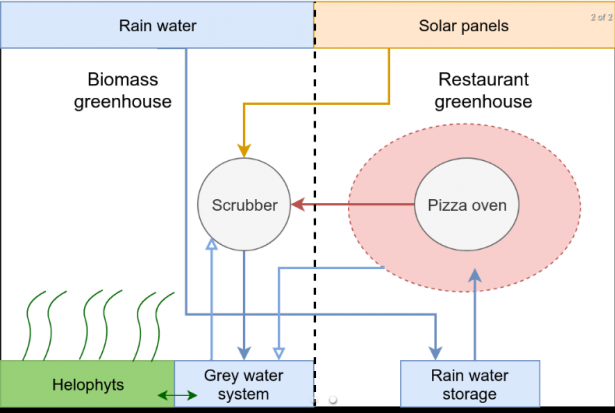
An abundance of one flow of resources can be absorbed by other resource cycles: Peak solar energy can be used in extra ventilation, aeration and irrigation. Sudden food surpluses are redistributed for free and create network solidarity. The Kaskantine is also able to use resources in all phases of their life cycle, like wood: from construction to fire wood. Or being able by using rest heat in storing it in mass or other spaces, or filtering waste water for irrigation. We call this adaptive capacity: the capacity to buffer abundance and use it later or in an alternative way.
Finally, an alternative lifestyle is embraced, one that is appreciating the value of abundance of local resources, rather than the value of market choice.
We could argue that the Kaskantine is thriving in an alternative economy, that can exist thanks to and despite of the mainstream economy that they are trying to transform. We call this abundance or give economy, in contrast with economy based on consumption and the organisation of scarcity.
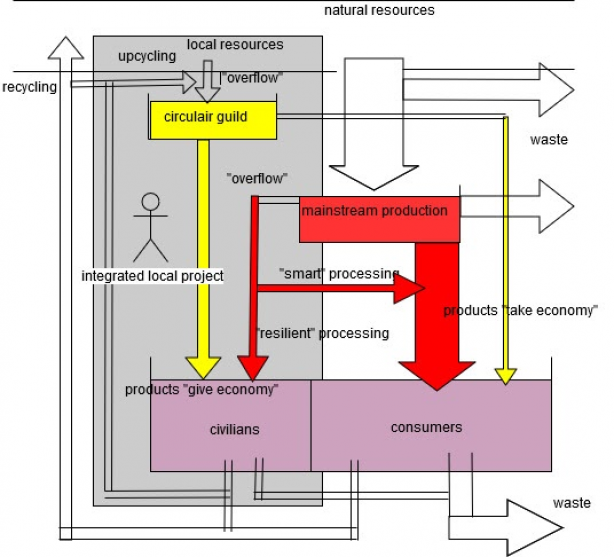
Abundance economy as being a sum of relatively autonomous integrated projects in mainstream economy.
Because of its ability to expand autonomously within mainstream economy, and because its abundance economy is not a zero-sum game as long as local resources and waste are underutilised, the Kaskantine is very open for participation. There is no economic argument against including more neighborhood activities, on the contrary. More participation seems therefore to depend more on the capability of cultural inclusiveness: if people feel comfortable within the network of the Kaskantine, or if people feel comfortable to start a sort of “kaskantine” on their own.
First, the opportunity to integrate has been ”built in” into the design of the Kaskantine by a step-in approach. From experience as a guest (exchange, tasting, get inspired, etc) to participation in the design, creation and operation of the Kaskantine and Kaskantine related projects.
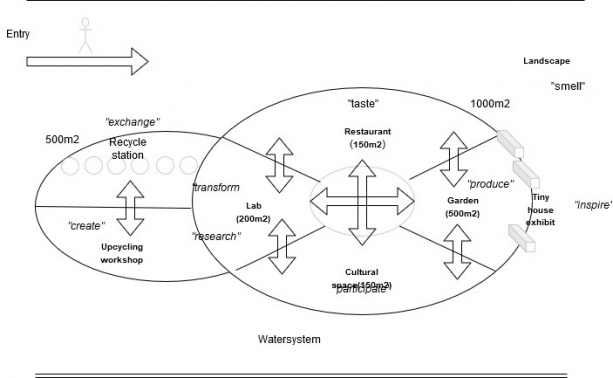
Secondly, the Kaskantine is also active in the neighbourhood centre and within a network of community organisations, with a step-out approach. In this case the Kaskantine offers through free workshops a learning curve to adopt small scale installations, like vertical gardens and worm composting, and participate in food saving and storage at home in order to take a step back from mainstream economy into the abundance economy.
An important ambition of the Kaskantine is to negotiate with the municipality a land lease contract in which the landuser takes responsibility for its development and environmental control of the land. This cheaper land rent will hopefully give other “kaskantines” the opportunity to arise.
The Kaskantine has free energy to spend on helping other groups in joining this movement because it can operate autonomously and with low fixed costs. This creates hopeful opportunities for inclusiveness of the proposed solutions. Whether this is done in some kind of co-creation with more central institutions depends more on their own capability to work with local small scale initiatives and on their willingness to change or compensate the negative effects of their lineair production models and on their willingness and capability to change sectoral into integrated policies.
Impact Hub Amsterdam launches report on pioneers of a sustainable food system
In the "Koplopers van de Korte Keten" (Pioneers of the Short Food Chain) report, five leading-edge Dutch pioneers of the short food supply chain discuss their drive and mission. The founders of De Melkbrouwerij, Herenboeren, Boerschappen, Vokomokum & Atlantis Handelshuis are using innovative, short-chain business models to build a fundamentally different system.
Read the report here: http://bit.ly/IHA-FoodChainReport (NB: in Dutch with English summary)
Pioneers of the Short Food Chain was created with the support of the Ministry of Agriculture, Nature and Food Quality, and Stichting DOEN.
JOIN IMPACT HUB'S FOOD ECOSYSTEM
This report is part of Impact Hub Amsterdam's Food Ecosystem. The Netherlands is the second largest exporter of agro-food products worldwide. What if we used this position to make a real impact across the food chain and accelerate the transition to a more sustainable food system? In this ecosystem, we bring together and strengthen relationships between entrepreneurs, investors, government, corporates and other organisations through events, programs and publications. Together we boost innovation and create the resources for positive change in the food sector. Read more about our Food Ecosystem at http://bit.ly/IHAFoodEcosystem
**** Do you have a good business idea for a more sustainable food system? Pitch it for the Fix Your Food Hackathon in January and win free startup training to make it reality! > http://bit.ly/FixYourFood ****
The Whole Package: Innovations in Food Packaging

Explore trends in sustainable food packaging, innovations & partnership opportunities at Impact Hub, with Futureproof.community.
About this Event:
How can we make food packaging sustainable? Plastic waste is a global problem, and the EU is preparing the transition towards a circular economy. Where does that leave food packaging? During this event, we will explore trends, innovations and opportunities, together with Futureproof.community by MVO Nederland.
For whom?
This evening is for innovation-seekers and makers. We will discuss success stories and do some live matchmaking, especially to make it easier for established companies and smaller innovative parties to find and talk to each other. You’ll meet and learn from entrepreneurs and innovators from our Food, Plastics, and Circularity Ecosystems and be able to start new collaborations.
Speakers
The warming up will be a panel interview, moderated by Caroli Buitenhuis of Green Serendipity, expert on bioplastics, circular economy and sustainable packaging. Chocolatemakers, Willicroft and People of Tomorrow will share their journey towards a sustainable package for their products.
Keynote speaker of this event will be Willemijn Peeters, founder of Searious Business, who helps (food) businesses to become plastic-free and circular. Her mission is to help transform our global economy and is an expert in bringing about organisational strategy & operational change.
Programme
19:00 Walk-in
19:30 Start
20:30 - 21:00 Matchmaking Drinks
About Futureproof.community:
You want to engage in more sustainable business, develop and move forward. For that, you need a product or service, knowledge or that one connection. Futureproof.community by MVO Nederland supports your search for the perfect match. For our 10.000 members, we already made over 4000 matches, so let us have a look at your entrepreneurial challenge! Do you want to know how it works? Watch this video.
About Impact Hub’s Food Ecosystem:
The Netherlands is the second largest exporter of agro-food products worldwide. What if we used this position to make real impact across the food chain and accelerate the transition to a more sustainable food system? Through our ecosystem approach, we bring together and strengthen relationships between entrepreneurs, investors, government, corporates and other organisations. Together we create innovation and resources for positive change in the food sector.
Fail Forward | Circular Edition

Only 9 per cent of the global economy is currently circular while adopting circular principles now could bring Europe net benefits of EUR 1,8 trillion by 2030. That is why Impact Hub Amsterdam hosts events, builds communities and runs acceleration programs around circularity. The next event on circular will be Fail Forward!
We believe that failure and experimentation are essential to developing innovative businesses that make a real impact. For the Circular Edition of our Fail Forward events, we are inviting circular impact entrepreneurs to share what they’ve learned from what went wrong. Listen to inspirational stories, get encouraged and leave with hope on the horizon ; )
Fail Forward line-up:
Speakers include Tiemen ter Hoeven of Roetz, Tynke van den Heuvel of Studio WAE and Dirk van der Beek of Boeren van Amstel.
Programme:
19:30 Registration & drinks
20:00 Speakers & Q&A
21:30 Drinks
Fail Forward is part of The Impact Days and is organized in partnership with the Province of Noord-Holland.
Solutions for the nitrogen emissions crisis
The nitrogen emissions crisis has seen as many as 18,000 construction and infrastructure projects stall across the Netherlands, and hundreds of farmers protesting in their tractors. But nitrogen impacts represent one of the greatest threats to our planetary life support systems, with big consequences for biodiversity and climate change.
So, why are nitrogen emissions a problem in the first place? Is the issue primarily related to construction, farming, or something else, and how do we fix this?
Our Industries team lead Pieter van Exter undertook some detailed analysis and outlines potential pathways out of the crisis.
Biologisch Tuinieren in de Stad
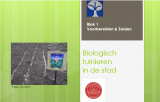
Voor alle nieuwe stadsboeren wordt een starterscursus gegeven over Biologisch tuinieren in de Stad. Op drie avonden in het voorjaar van 2020 leer je alles over zaaien, verzorgen en oogsten van biologisch voedsel. Bij de afsluitende praktijkproef op de Hoeve Klein Mariëndaal in Arnhem kun jij ook het stadsboeren certificaat verdienen. Voor meer informatie kun je terecht op: www.learningisgrowing.nl
Going to school on circular solutions
Are you feeling 'climate anxiety'? You are not alone.
Annebel Dommer wrote about her search for ways to reverse her feeling of helplessness. She came across the summer school course on circular cities, offered by Metabolic in collaboration with the Universiteit van Amsterdam. In her blog, Annebel opens up on how the course equipped her with practical and solution-oriented approaches to environmental problems, and embedded her into a class full of motivated students with a sense of climate optimism.
Click through to read her blog and hear her thoughts
YIMBY Yes-In-My-Back-Yard Amsterdam!
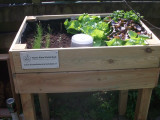
The grassroots movement YIMBY Yes-In-My-Back-Yard! stimulates local food growing in the city. The so called YIMBY food growing containers are the first food growing experience for citizen. Together with green lessons citizen will grow in local food growing in the city. At the national neighbour day a yearly green event is organized to exchange green ideas and good food.
Arnhem - Het Arnhemse burgerinitiatief YIMBY, Yes-In-My-Back-Yard Arnhem! is genomineerd voor de duurzame Top 100 van het dagblad Trouw. De elfde editie van de duurzame Top 100 in 2019 is een lijst van onderop, van burgers die het heft in eigen handen nemen en zelf een duurzaam initiatief opzetten.
In 2013 hebben burgers vanuit het buurthuis 't Huukske in Arnhem-West het initiatief genomen om mobiele moestuinbakken op te zetten in de wijk. Het initiatief krijgt al snel de naam YIMBY Arnhem! De afkorting YIMBY staat voor Yes-In-My-Back-Yard en betekent dat burgers positief staan om eigen initiatieven in de achtertuin te starten. Bij YIMBY Arnhem! staan moestuinbakken, groen en ontmoeten centraal.
Voor de burgers in de wijk zijn de YIMBY moestuinbakken vaak de eerste kennismaking om zelf groenten en kruiden in de stad te verbouwen. De ervaring is dat de eigenaars van YIMBY moestuinbakken als vervolgstap kiezen voor het telen van groente in een grotere voedseltuin in de stad. Om het telen van voedstel te ondersteunen wordt ieder voorjaar in de wijk de cursus "Biologisch Tuinieren in de Stad" gegeven.
De YIMBY moestuinbakken worden al zeven jaar gemaakt door deelnemers en vrijwilligers van de zorgboerderij Hoeve Klein Mariëndaal in Arnhem-West. In totaal hebben de timmermannen van de Hoeve Klein Mariëndal al meer dan 100 YIMBY moestuinbakken geleverd. Voor de zevende keer wordt op de Hoeve Klein Mariëndaal het YIMBY Oogstfeest gehouden op burendag. Het YIMBY Oogstfeest wordt georganiseerd door vrijwilligers en nodigt deelnemers van de zorgboerderij en eigenaars van de YIMBY moestuinbakken uit voor een zelfgemaakte maaltijd. Deze maaltijd wordt gesponsord door de middenstand in de wijk Arnhem-West.
Op 10 oktober 2019 wordt de lijst van de duurzame Top 100 van het dagblad Trouw gepresenteerd. In zeven jaar zijn veel resultaten met groen en ontmoeten in de stad Arnhem bereikt. Gezien het langdurige succes van de YIMBY moestuinbakken is de kans groot dat YIMBY Arnhem! in deze lijst zal voorkomen.
Ook geinteresseerd in een YIMBY moestuinbak? Kijk op website www.hoevekleinmariendaal.nl met het zoekwoord: YIMBY.
BuurtBuik social circulair foodinitiative
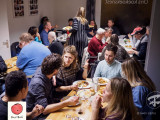
Sharing is caring, as the young folks say.
BuurtBuik is all about sharing food with your neighbors. We cook meals from food that would be wasted otherwise. Thereby, bringing people together around a free three course meal and build their social network. It impacts both environmental and social goals, thus, bridging the gap to a circular social economy. Come around a see it in action, we feed 500 people three course meals every week!
SDG Action Day

Kom op 25 september naar de derde SDG Action Day in het SDG House in Amsterdam! Deze dag is hét moment om alles te weten te komen over de SDGs: waar staan we op de routekaart naar 2030, waar liggen kansen en hoe kan ik het zelf aanpakken? Connecting Generations is het thema dit jaar, omdat jonge koplopers ons de weg wijzen. De Jonge Klimaatbeweging en Youth 4 Climate laten zien hoe ze Nederland in beweging kregen, kan dat ook voor de andere werelddoelen? Sinds dit jaar zetten alle hogescholen de SDGs in hun onderwijs en stageprogramma. Nienke Meijer (Voorzitter van Bestuur Fontys Hogescholen) legt uit waarom en hoe. Ook in bedrijven laten jongeren van zich horen over de SDGs. Hoe dat uitpakt, vertelt directielid Conny Braams van Unilever.
Iedereen doet mee – oftewel “inclusiviteit”- is de kern van alle SDGs, en alle generaties worstelen ermee. Aynouk Tan laat je daarom met andere ogen naar diversiteit en identiteit kijken: vanuit de mode. Maak verder kennis met de nieuwe nationale SDG Coördinator Sandra Pellegrom, vers uit New York, die je bijpraat over de stand van zaken rondom de SDGs. Minister Kaag zal vanuit de SDG top bij de Verenigde Naties inbellen voor het laatste nieuws. En je gaat zelf aan de slag, met 26 workshops om uit te kiezen. SDG Action Day wordt overal ter wereld gevierd, doe mee!
Amsterdam Biochar Initiative

Biochar is a soil amendment made typically from bio-mass through a process called pyrolysis with low-oxygen. By using a low-cost, easy-to-make biochar stove, communities can arrange to turn common waste products into biochar.
The vision behind this project is for healthy and resilient communities. This means that I prefer methods that promote local, DIY and community approach, so that it can quickly scale and adapt to different towns/cities.
Most importantly, carbon being the element behind Life has tremendous versatility. It can be used to filter water and then used as a soil amendment. Or it can be mixed to make better concrete composites for roads (asphalt) and concrete. It can improve manufacturing by making carbon fiber alloys.
Last but not least, it is done through a circular model of using waste such as wood sticks, bio-mass, paper, saw dust mills, anything with carbon, even plastics. The output heat can be captured for heating buildings and cooking stoves. The opportunities are endless.
Sizes of stove vary in function of available supply/demand dynamics. For more information, check the biochar-international.org or Ithaka International.
Thank you.
PS: Stockholm, Sweden has achieved this recently. If the Swedes can do it, we can learn from them and improve together!
http://www.nordregio.org/sustainable_cities/stockholm-biochar-project/
Some guidelines for background and context
https://www.biochar-international.org/wp-content/uploads/2018/04/IBI_Pyrolysis_Plant_Guidelines.pdf
Plastic Waste Recyling
Hi everyone!
I am Enrico, office coordinator for a startup of e-scooter sharing. I am looking for companies who can collect and reuse our plastic waste and turn it into swags and other objects and create nice cooperation around plastic reuse. We are also looking for a partner in handling our organic food waste to create compost!
Thank you all!
Zero Waste Zuidas 2030
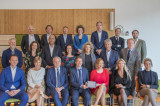
At the annual Green Business Club Zuidas CEO breakfast, 25 CEO's of Zuidas companies signed an agreement on becoming "Zero Waste" by 2030. This initiative is a collaboration with Amsterdam Economic Board. (Dutch)
Tijdens het jaarlijkse Green Business Club Zuidas CEO-ontbijt ondertekenden 25 CEO’s voor een Zero Waste Zuidas in 2030. Het doel: een circulaire Zuidas waar elk restproduct weer het begin is van iets nieuws. Voedsel, grondstof, herbruikbaar materiaal en uiteindelijk energie.
Fred Bos, Senior Managing Director van ABN AMRO licht toe waarom zij een van de initiatiefnemers zijn van Zero Waste Zuidas: “Komen tot nul restafval in 2030 is realistisch wanneer we morgen beginnen. Niet alleen vanwege de technieken en innovaties, maar juist ook vanwege dit bestaande samenwerkingsverband.”
Met grote volumes samen naar nul
Met ruim 43.000 werkzame mensen vormt Zuidas het grootste zakendistrict van Nederland. Hoewel exacte cijfers niet bekend zijn, wordt er ruim 4 miljoen kilo afval geproduceerd op jaarbasis, waarvan het grootste gedeelte restafval is. Met het ondertekenen van de overeenkomst committeren bedrijven zich aan het gezamenlijk aanbesteden van afvalstromen. Deze aanpak creëert volume, waardoor afval zo optimaal en hoogwaardig mogelijk kan worden verwerkt. In 2020 starten de deelnemers met papier, karton, plastic en organisch afval.
Ronald Voorsluijs, CEO van Milieu Service Nederland, zet in op zero waste en zero emission: “Zo wordt bijvoorbeeld het organisch afval van de Goede Doelen Loterijen op locatie gecomposteerd. Medewerkers kunnen het compost voor eigen gebruik mee naar huis nemen. Dit voorkomt afval én gesleep.”
Samenwerking
Zero Waste Zuidas is een initiatief van Amsterdam Economic Board en Green Business Club Zuidas. De participanten van Green Business Club Zuidas zetten zich al jaren in voor het verminderen van het restafval en het hoogwaardig verwerken van monostromen. Bestaande initiatieven zijn een goede basis voor verdere samenwerking tussen participanten en opschaling. De Amsterdam Economic Board werkt aan een regionaal grondstoffentransitieprogramma waarbij samenwerking en schaal essentieel zijn voor innovatie, vernieuwing en grootschalige verandering.
“Zero Waste Zuidas betekent circulariteit als uitgangspunt door de hele keten. Dat houdt in: anders ontwerpen, inkopen, slimmere logistiek, duurzame bronnen en hergebruik. Wanneer dat in Zuidas lukt, lukt het overal. De blauwdruk van deze beweging, het hoe en wat, kan door andere zakendistricten, bedrijventerreinen, overheden en Green Business Clubs worden gebruikt om afvalstromen volledig circulair te maken”, aldus Marjolein Brasz, Challenge Lead Circulaire Economie bij de Amsterdam Economic Board.
Entrepreneurial Solutions for a Sustainable City
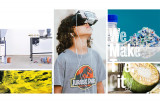
An event during WeMakeThe.City
This full-day experience at Impact Hub Amsterdam is the perfect opportunity to explore how Impact Hub makes cities more sustainable and vibrant through entrepreneurial solutions in plastics, food, inclusion, and circularity. Come get inspired by the diverse solutions of our impactmakers!
You can create your personalised schedule by purchasing tickets to the sessions you want to attend. From attending one session to spending the whole day with us - it's up to you! Learn more and sign up > bit.ly/IHA-WMTC
This event is powered by Impact Hub and the City of Amsterdam (Amsterdam Impact).
MORNING PROGRAM | OPTION 1
10:00 - 12:00 | Impact Entrepreneurs in Action: Gender, Migration and Circular Economy
We need diverse solutions to solve global and local challenges. Want to find out how YOU can make a difference and support the development of these solutions? Join this interactive session co-created by Impact Hub Amsterdam and C-Change! You’ll get inspired by impactmakers working in gender, migration and circular economy, as well as contributors from The Next Women, Crosswise Works, Generous Minds, and Circle Economy.
MORNING PROGRAM | OPTION 2
10:00 - 12:00 | Circular Strategies
To innovate for a circular economy we must narrow, slow, close and regenerate material resource and energy loops. In this two-hour session featuring Jan Konietzko from TU Delft, you will learn more about these key circular strategies. Use a brainstorm card deck developed at TU Delft to get inspired and generate circular ideas you can start implementing in your business right away! This session is part of our collaboration with the Province of Noord-Holland, which aims to become fully circular by 2050.
12:15 - 13:15 | Lunchtime: Vegan Lunch for €5
AFTERNOON PROGRAM | OPTION 1
13:30 - 15:30 | Make Your Money Green: Sustainable Investing for Newbies
You can accelerate the transition to a sustainable future by investing from as little as €250. How? Through crowdfunding! In this interactive session, crowdfunding platform Oneplanetcrowd will share all the insights you need to start investing in companies and initiatives that contribute to the Sustainable Development Goals (SDGs). You’ll also hear the crowdfunding stories of impact entrepreneurs working on the SDGs, join speed date sessions with these entrepreneurs, and more!
AFTERNOON PROGRAM | OPTION 2
16:00 - 18:00 | Perspectives on Food and Climate
In this session, the DOEN Foundation will discuss the link between climate action and sustainable food - from how the current food system contributes to climate change to how companies, consumers and policymakers can help lower food’s climate impact! Learn from experts and entrepreneurs about how the concept of ‘food’ is perceived, marketed and sold, and what impact food has on our climate.
AFTERNOON PROGRAM | OPTION 3
13:30 - 18:00 | New Plastic Ecosystem Meetup
Our second plastics ecosystem meetup is a unique opportunity to meet partners from our ecosystem, and get inspired by the next generation of entrepreneurs with solutions to reduce plastic waste worldwide! Featuring a keynote by Ellen MacArthur Foundation, roundtables and panel discussions with alumni of our Plastic Free Ocean Accelerator and partners such as the Port of Amsterdam, WWF and Accenture. Plus the chance to meet the winners of the Dopper Changemaker Challenge, and hear pitches by our Business Model Challenge| Plastics Edition participants!
EVENING PROGRAM
18:15 - 19:30 | Miha Pogacnik: Visionary, Violinist and Cultural Entrepreneur
Experience a unique performance on divergent problem-solving by world-famous violinist and visionary Miha Pogacnik. There is no right or wrong, only participation and creation.
19:00 - 23:00 Experience Impact: Heroes of Amsterdam VR Screening and Party
Frank Heckman, founder of the Embassy of the Earth, will kick off the evening session with stories of his incredible work with heroes around the world. Then, Impact Hub members Heroes & Friends will introduce us to inspiring initiatives working on the SDGs in Amsterdam.
As winners of the City of Amsterdam’s Localise the SDGs Challenge on the EU Social Challenges platform Heroes & Friends have helped these initiatives share their stories through Virtual Reality (VR) experiences!
After the talk from Heroes & Friends, it’s time for drinks, snacks and live music! You can also pop into our screening room for VR experiences of the local heroes working an inclusive and vibrant city for all.
THROUGHOUT THE DAY
The Future of Food
In addition to food for thought, we have some delicious bites to keep you running from one event to the next. Come and taste the plant-based, fairly produced treats of Meet Jack, FRANK about tea, Plant-Based Cheese, and many more!
Open Kitchen Science met Rosanne Hertzberger

Many bacteria in the human body live in a low-oxygen environment. To be able to grow these in a lab, an easy to maintain, affordable low-oxygen incubator must be build. An Open Kitchen Science evening with Rosanne Hertzberger.
The entrance fee is € 5 including a drink. This evening is in English.
Rosanne Hertzberger
Rosanne Hertzberger is a writer, columnist and microbiologist. As an independent researcher at VU University Amsterdam she studies vaginal bacteria and the influence of these bacteria on the health of women and children, for example in premature birth. Hereby she practices Open Kitchen Science, focused on cooperation, radical transparency and openness. The ultimate goal is to make the scientific method accessible to everyone.
Open-source hardware at Waag
The Open Wetlab van Waag builds open-source hardware, whereby designs for laboratory equipment are shared via open-source. For example, participants of the BioHack Academy build their own do-it-yourself devices for use in experiments.
Programme
19:30 Doors open
20:00 Introduction by Lucas Evers
20:30 Rosanne Hertzberger
21:30 Q&A with Roland van Dierendonck, Lucas Evers and Rosanne Hertzberger
Floriade Dialogues Summit

It is a pleasure to announce the first international Floriade Dialogues Summit on green and healthy food cities for all!
The keynote speakers Raj Patel, Charles C. Mann and Adriaan Geuze will shake you up in the morning programme. In the afternoon we serve you the Talks of the Town with many inspiring cases from green and healthy pioneers all over the world: from Zimbabwe and Detroit to Almere!
Sign up now for new Startup in Residence Sustainability incubator!
Startups & scaleups and social enterprises, check out our 2019 sustainability programme and sign up now: https://startupinresidence.com/amsterdam/
The governmental startup incubator Startup in Residence gives sustainable entrepreneurs the opportunity to collaborate with the local government towards solving 18 sustainable city challenges. The sustainability challenges cover a variety of topics including waste recycling, new energy sources, sustainable sports city, climate-proof city, etc. Add to that, we as a municipality, would like to become more innovative and sustainable. Find the complete list of challenges here: http://bit.ly/2tbYfmN !
Apply for our programme now! We’re looking forward to receiving your applications from February 5th until March 24th 2019!
Startup in Residence Sustainability is live!
Startups & scaleups! Check out our 2019 programme and sign up now!
Startup in Residence invites sustainable entrepreneurs to collaborate with the local government towards solving 18 sustainable city challenges. The sustainability challenges cover a variety of topics including waste recycling, new energy sources, sustainable sports city, climate-proof city, etc. Add to that, we as a municipality, would like to become more innovative and sustainable. Find the complete list of challenges here: http://bit.ly/2tbYfmN !
Apply for our programme now! We’re looking forward to receiving your applications from February 5th until March 24th 2019!
Stay up to date
Get notified about new updates, opportunities or events that match your interests.

